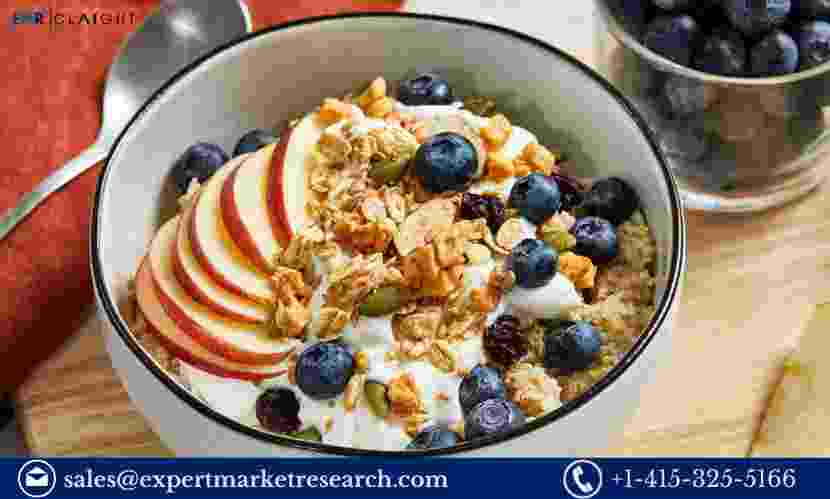Muesli Manufacturing Plant Project Report 2024: Industry trends and Plant Setup

Introduction
Muesli, a popular breakfast and snack option, is a blend of rolled oats, nuts, seeds, and dried fruits. Known for its nutritional benefits, muesli is rich in fiber, vitamins, and minerals, making it a favored choice among health-conscious consumers. The demand for muesli has surged in recent years due to the growing trend toward healthy eating and convenient meal options. This Muesli Manufacturing Plant Project Report outlines the establishment of a muesli manufacturing plant, covering market analysis, production processes, financial projections, and operational strategies.
Overview of Muesli
Muesli is often perceived as a healthier alternative to traditional breakfast cereals. Unlike processed cereals, muesli is typically unrefined and contains no added sugars, artificial flavors, or preservatives. It can be enjoyed with milk, yogurt, or as a topping for smoothies, making it a versatile food product.
Nutritional Benefits of Muesli
- High in Fiber: Promotes digestive health and helps maintain a healthy weight.
- Rich in Antioxidants: Nuts and dried fruits are packed with antioxidants that combat oxidative stress.
- Source of Healthy Fats: Nuts provide essential fatty acids that support heart health.
- Energy-Rich: Muesli is a great source of energy, making it ideal for breakfast or snacks.
Market Analysis
Industry Trends
- Growing Health Consciousness: Consumers are increasingly seeking nutritious and convenient food options, leading to a rise in demand for muesli.
- Rise of Vegan and Plant-Based Diets: Muesli aligns with vegan and plant-based eating habits, making it popular among these demographic groups.
- Expansion of E-commerce: Online grocery shopping has grown significantly, providing an opportunity for muesli manufacturers to reach a broader audience.
Get a Free Sample Report with Table of Contents @
Target Market
The primary target market for muesli includes:
- Health-conscious Consumers: Individuals seeking nutritious breakfast and snack options.
- Fitness Enthusiasts: Athletes and active individuals looking for energy-rich foods.
- Busy Professionals: Those requiring quick and healthy meal solutions.
- Parents: Seeking nutritious options for their children’s breakfast.
Competitor Analysis
Key competitors in the muesli market include:
- Established Brands: Well-known companies that have a strong market presence and brand loyalty.
- Local Producers: Smaller brands focusing on organic and niche markets.
Project Feasibility
Location Selection
Choosing the right location for the manufacturing plant is crucial. Important factors include:
- Proximity to Raw Materials: Access to suppliers of oats, nuts, seeds, and dried fruits to minimize transportation costs.
- Labor Availability: A skilled workforce experienced in food manufacturing processes.
- Infrastructure: Adequate utilities and transportation networks to support plant operations.
Technical Feasibility
The manufacturing process for muesli typically involves several key steps:
- Raw Material Sourcing: Identify reliable suppliers for oats, nuts, seeds, and dried fruits.
- Oat Preparation: Clean and process rolled oats, ensuring they meet quality standards.
- Mixing Ingredients: Combine oats, nuts, seeds, and dried fruits in specific ratios.
- Roasting: Optionally roast the mixture to enhance flavor and texture.
- Packaging: Package the finished product in airtight containers to preserve freshness.
Financial Projections
The initial investment will cover land acquisition, construction, machinery, and operational costs. A rough estimate includes:
- Land and Construction: $1 million
- Machinery and Equipment: $600,000
- Initial Raw Materials: $200,000
- Operational Costs: $400,000
Revenue Streams
Revenue can be generated through:
- Direct Sales: Supplying muesli to grocery stores, health food stores, and cafes.
- Online Sales: Establishing an e-commerce platform to sell directly to consumers.
- Long-term Contracts: Partnering with distributors and retailers for consistent sales.
Manufacturing Process
Step-by-Step Production
- Raw Material Preparation:
- Source high-quality oats, nuts, seeds, and dried fruits from reliable suppliers.
- Oat Processing:
- Clean and steam the rolled oats to eliminate contaminants and improve shelf life.
- Ingredient Mixing:
- Mix the oats with nuts, seeds, and dried fruits according to predetermined recipes to achieve the desired flavor and nutritional profile.
- Optional Roasting:
- Roast the mixture at controlled temperatures to enhance flavor and texture. This step can be adjusted based on consumer preferences.
- Cooling:
- Allow the mixture to cool before packaging to prevent moisture buildup.
- Packaging:
- Package the muesli in airtight containers, ensuring that the packaging is appealing and informative, detailing nutritional information and ingredients.
Quality Control
Implementing a robust quality control system is essential. Regular testing for taste, texture, and nutritional content ensures that the final product meets consumer expectations and regulatory requirements.
Marketing Strategy
Branding
Creating a strong brand identity is vital in the competitive muesli market. The brand should emphasize quality, health benefits, and natural ingredients, appealing to health-conscious consumers.
Advertising
Utilize a mix of marketing strategies:
- Health and Wellness Expos: Participate in events to showcase products and network with potential customers.
- Digital Marketing: Use social media, SEO, and content marketing to increase brand awareness and educate consumers about the benefits of muesli.
- Sampling Campaigns: Offer free samples in grocery stores and health food shops to attract new customers.
Distribution Channels
Employ various distribution channels, including:
- Direct Sales: Establish relationships with grocery stores, health food shops, and cafes for direct sales.
- Online Platforms: Develop an e-commerce website for inquiries and orders related to muesli.
- Distributor Partnerships: Collaborate with distributors to reach a broader audience.
Operational Considerations
Staffing Requirements
A skilled workforce is crucial for smooth operations. Key positions include:
- Production Manager: Oversees manufacturing processes and ensures compliance with safety and quality standards.
- Quality Control Inspector: Conducts regular testing and inspections to maintain product quality.
- Sales and Marketing Team: Drives brand awareness and manages relationships with customers.
Equipment Needed
Essential machinery includes:
- Mixing Equipment: For combining oats, nuts, seeds, and dried fruits.
- Roasting Machines: For roasting the mixture (if applicable).
- Cooling Systems: For cooling the mixture before packaging.
- Packaging Machines: For sealing the muesli in airtight containers.
Regulatory Compliance
Compliance with food safety regulations is critical for the manufacturing of muesli. This includes:
- Good Manufacturing Practices (GMP): Adhere to guidelines ensuring products are consistently produced and controlled according to quality standards.
- Health and Safety Regulations: Implement safety measures to protect workers and comply with local and international safety standards.
Financial Analysis
Startup Costs
- Total Estimated Startup Costs: $2.2 million
Revenue Projections
Assuming an average sale price of $5 per kilogram and a monthly production of 20,000 kilograms, the revenue would be approximately:
- Monthly Revenue: $100,000
- Annual Revenue: $1.2 million
Break-Even Analysis
To cover initial costs, a break-even analysis indicates that the business will need to sell around 600,000 kilograms annually, translating to about 50,000 kilograms monthly.
FAQs
1. What is the initial investment required to start a muesli manufacturing plant?
The initial investment is approximately $2.2 million, covering land, construction, machinery, and operational costs.
2. What types of products can be produced?
The primary product is muesli, which can be customized with various ingredients like nuts, seeds, and dried fruits to meet consumer preferences.
3. How can I ensure product quality?
Implement a robust quality control system, including regular testing for taste, texture, and nutritional content.
4. What are the marketing strategies for muesli products?
Effective marketing strategies include participation in health and wellness expos, digital marketing, and sampling campaigns.
5. Who are the major competitors in the market?
Key competitors include established brands with a strong market presence and local producers focusing on organic or niche markets.
6. What is the target market for muesli?
The target market includes health-conscious consumers, fitness enthusiasts, busy professionals, and parents looking for nutritious options for their children.
7. How long does the manufacturing process take?
The manufacturing process can take a few days, depending on the scale of production and the specific formulations being produced.
Related Reports
https://www.expertmarketresearch.com/articles/top-lead-acid-battery-for-energy-storage-manufacturers
https://www.expertmarketresearch.com/reports/india-tyre-market
https://www.expertmarketresearch.com/articles/top-mayonnaise-companies
Media Contact:
Company Name: Claight Corporation
Contact Person: Lewis Fernandas, Corporate Sales Specialist — U.S.A.
Email: sales@expertmarketresearch.com
Toll Free Number: +1–415–325–5166 | +44–702–402–5790
Address: 30 North Gould Street, Sheridan, WY 82801, USA
Website: www.expertmarketresearch.com
Aus Site: https://www.expertmarketresearch.com.au






